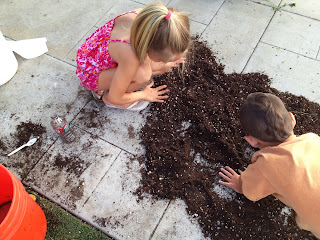Rolly poley farm
I smile and join in, my fingernails far dirtier
than theirs.
I am
happy to abandon the activity I had planned. It involved making planters:
newspaper rolled around a can, taped up, sharpi-ed with a name of a child, the name of a vegetable.
They
dug soil out of an orange bucket. One of the kids had found plastic spoons to
use. I said they could use their hands. They didn't want to get dirty, they
said. Kids not wanting to get dirty? I told them I loved getting dirty, that
soil is good, that that is where all our food comes from. They spooned the soil
into the little planters, chose their popcorn or squash seeds, beans or
radishes. They made more planters, planted more seeds. They drowned their seeds
in water, put them in the sun to grow.
A small
boy with a mohawk checked on his seeds every twenty minutes to see if they were
growing yet. I told him it might take a week. How long a week is to a kid! I
miss that feeling of endless time on hot summer days playing in
the bushes and trees in the front yard, doves declaring summer evenings, the
smell of Eucalyptus and chlorine and barbecued chicken. A week was a lifetime
away.
But the
seed would probably grow in a few days if he watered it, I said. He could plant
it in his yard. "I don't have a yard." Plant it in someone else's
yard, I said, but knew this wasn't a good answer. I knew the roots would become
bound, the paper disintegrate if he wasn't able to find a home for it in a
couple of weeks. Would that discourage him from growing anything else in his
life? Was I setting these apartment-bound kids up for traumatic plant-killing
experiences instead of welcoming them to the fascinating world of gardening?
Was I being classist and inconsiderate? Whoa farmer, I thought. Hopefully the
adults in their life will step in and find a bigger planter, find a spot in the
sun, nourish and encourage and grow. I can help plant the seed but I can't farm
everyone, right? Besides, with all the hula hooping and glitter and bead art
projects this afternoon, the chances of him remembering his little planters
could be slim. But maybe he'd plant a seed again some day with this memory
kicking around in the back of his little head.
My favorite part of the afternoon was not rolling and taping and
filling and seeding. It was when the kids plunged their hands into the dirt
looking for rolly-poleys, when they filled a plastic bottle with dirt and leaves
for their rolly-poley farm and deposited found bugs in their new home. Should
we poke holes so they can breathe? they asked, concerned for the wellbeing of their new pets. When digging in the bucket
seemed ineffective they asked if they could dump out the dirt on the sidewalk.
They seemed to expect me to say no, it would be too messy.
I said sure, lets do
it.
We'll clean up the mess, they said without me saying anything about it.
I
smiled. "I like messes."
Dirty
elbows and knees, kids looking through the dirt, asking other kids to come
help.
I love nothing more than getting kids dirty. I rarely see it. These city
kids are told to stay clean. So many are scared of the earth that feeds them
because their parents are too. So I tell them to get dirty, smell the soil,
taste the chocolate mint and rosemary that sits on the table nearby.
I think it
is my job. But they teach me too. They give the bugs names and push around the
soil and are earnest in their pursuit, totally in the moment. They are not
thinking about climate change or where their dinner will come from. They stay
until the hula hoops or glitter wands call to them and then they focus on gyrating and gluing glitter strewn beads to paper.
I smile
and am happy in this moment, in this dirt, a water bottle full of rolly-poleys
at my feet.

Comments